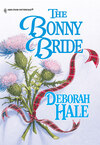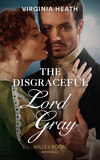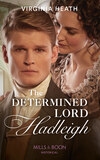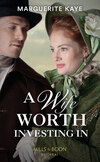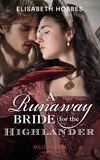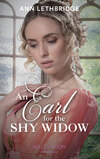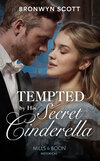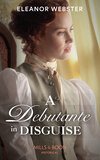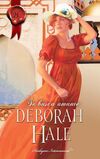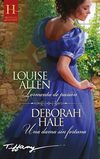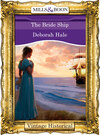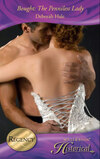Kitabı oku: «The Bonny Bride», sayfa 2
Chapter Two
“Miss Lennox?” Harris called. Getting no answer, he pounded on her cabin door more insistently. “Jenny!”
As he’d predicted, a nasty gale had blown up when the St. Bride rounded the treacherous north coast of Ulster. If she’d been crossing the Atlantic in the other direction, with holds full of heavy New Brunswick timber, it would not have been so bad. As it was, running against the wind, lightly laden with mercantile goods, the barque bobbed helplessly in the heavy seas.
Beneath Harris’s feet, the deck gave a sudden violent roll, sending him crashing against the door of Jenny’s cabin. The flimsy deal boards gave way before him. He lurched into the cabin, barking his shin on something sharp and solid before sprawling onto the floor. Behind him, the cabin door banged open and shut in time to the shifting pitch of the vessel, admitting fleeting flashes of lamplight from the passage. Between those flickers, the small chamber was impenetrably dark.
Where could Jenny Lennox have gone? Harris wondered as he rubbed his smarting shin. She had agreed not to leave her cabin without him. Women, he grumbled under his breath. Making all sorts of glib promises to get their way. Then they went ahead and did as they pleased, without so much as a by-your-leave.
A low, anguished moan sounded near Harris’s right ear. Flailing out in the direction of the sound, his hand made solid contact with the clammy flesh of Jenny’s face.
“Miss Lennox, what are ye doing lying here in the dark?”
“Dying,” came a weak, raspy reply.
Beneath the pervading odors of salt water and wet wood, Harris smelled the sour stench of vomit. Masked by the darkness, he allowed himself a wry smile at Jenny’s expense. Apparently, beauty was not proof against the mundane rigors of seasickness.
He let his hand linger on her cheek. “Ye’re not going to die.”
“I want to.” The words came up on her rising gorge.
Harris dodged out of the way as Jenny leaned over the edge of her berth. For several seconds she gagged agonizingly, but with little result. When she sank back onto the pillow again, Harris bent over her. He had to lean close, to make himself heard above the thunder of waves crashing against the hull and the high, fitful whine of the wind.
“If ye can feel that bad and still make a joke, I expect ye’ll pull through,” he said gently. “Rest, now. I’ll go fetch Dr. Chisholm’s cure for ocean belly.”
“I don’t care,” Jenny whimpered. “Do what ye like with me.”
Harris almost laughed. Ye’ve no idea what I’d like to do with ye, lass, he thought to himself. If ye did, ye’d never have made me such a tempting offer, no matter how poorly ye felt. Leaning so close to Jenny, he could feel the warmth emanating from her body.
He must be daft to even entertain such fancies, Harris rebuked himself as he reluctantly pulled away from her. Minding his tender shin, he felt his way toward the door with ginger steps. Once the gale subsided, he’d have to do something about that broken latch. In the meantime, the damp air below decks had swollen the wood enough to make the door stick shut when he pulled it to.
He staggered back down the companionway a while later, lantern in hand and a book under his arm. A firm nudge from his shoulder was all it took to push Jenny’s door open again. Harris held the lantern high as he entered the cabin. He was not anxious to injure himself further, nor to pitch face-first onto the slimy floorboards.
Jenny shrank from the light, pulling a blanket over her head. “Put it out. It’s not so bad when I can’t see everything in the cabin rocking and swaying.”
Harris took his bearings. Somehow, Jenny’s brass-bound trunk had worked itself out from under her berth. It must have been the culprit responsible for his bruised shin. He cast the trunk a baleful glare and pushed it up beside the head of the berth.
“I need the light for a minute,” he told Jenny. “Then I’ll put it out.”
Her head still covered with the blanket, she did not respond. Harris hung the lantern from a hook driven into one of the ceiling beams. He found a heavy stoneware jug of water and tipped a splash of it onto his handkerchief. Securing an enamel basin against future need, he extinguished the lamp. Then he felt his way back to Jenny’s trunk, and sat down on it.
“Why don’t ye go away and leave me to die in peace?” Jenny moaned. She must have thrown off the blanket, for her words were no longer muffled.
“All part of the bargain.” Harris found her face and swiped his wet handkerchief across her forehead. “I promised yer father I’d see ye safe to Miramichi.”
Fumbling in his coat pocket, he produced a small flask. Supporting Jenny’s shoulders with one arm, he held it to her lips. “Take a sip of this. If ye can keep a bit of it down, it’ll help ye sleep. I ken that’s as much as we can do for ye tonight—let ye sleep until the storm’s past.”
She sat bolt upright, spitting a fine spray of whisky into his face. “What is that stuff? It tastes foul!”
“Fouler than what’s in yer mouth already?” Harris growled, mopping his face with the handkerchief. “For yer information, this is the finest single malt whisky—good for a variety of medicinal purposes, including the treatment of seasickness. Now drink it!”
Reluctantly she obliged. Harris could almost hear her grimace at the taste of the liquor.
“Lie back, and let that settle a minute before we try another drop.”
“I’ll never keep it down. It’s burning all the way!”
“Aye,” he replied dryly. “It’ll light a fire in yer belly, too. Now, while we’re waiting for the whisky to do its work, ye need something to keep yer mind off how miserable ye feel. If ye’d let me light the lantern again, I brought a book I could read to ye.”
“What’s the book?” she asked.
Harris thought he heard a note of longing in her voice.
“One of my favorites—Walter Scott’s Rob Roy.”
“Oh.”
Never had he heard so wistful a sound as that brief word.
“It’s no use,” Jenny said finally. “I couldn’t bear the light. Rob Roy—it sounds a brave story. What’s it about?”
“Take another drink of the whisky first.”
She submitted with a sigh of resignation. Though she gasped as the whisky went down, she did not spew it back up again. Harris took it as a sign his prescription was working after all.
Hunching forward, he brought his mouth close to Jenny’s ear so he would not have to shout above the storm. Harris began to relate the story of Frank Osbaldistone and his adventures with the outlawed Rob Roy McGregor. Now and then, he lapsed into Scott’s dramatic prose, reciting whole passages from memory. At regular intervals, he paused to prop Jenny up and administer another dose of whisky.
“Feel any better?” he asked after an hour had passed without further bouts of vomiting.
“I feel queer,” she replied in a thick, drowsy voice, “but not so bad as before.”
“I’ll go away and let ye sleep then.”
She groped for his hand. “Stay. Yer story keeps my mind off my stomach. It must be grand to be able to read books like that.”
“I’d be happy to lend ye anything I have,” Harris offered. “I expect ye haven’t had much money for books.”
Sinking back on her pillow, Jenny gave an oddly bitter laugh. “No money. No time. No learning.” She sniffled. “I fear I’ll be a right disappointment to Roderick Douglas—an ignorant farm girl who can’t read a word or write her ain name.” Her words trailed off into quiet sobs.
That would be the whisky at work, Harris decided. It often had the unfortunate side effect of making the drinker wax maudlin.
“There, there.” He wiped her face with his handkerchief. “Wist, now. Ye’ll upset yerself and end up sick to yer stomach again. It’s a daft chap who’d complain of a bonny bride like ye, Jenny Lennox.”
“What are ye doing here anyway, Harris Chisholm?” She pushed his handkerchief away. “I ken ye reckon I’m stupid and common. I’ve seen ye look down yer long nose at me often enough. Go ’way, now. I don’t need yer drink, nor yer stories, nor yer pity, neither.”
Harris could hear her moving about in the narrow berth—turning her back on him, most likely. For a moment he sat, not knowing what to say or do. He’d always thought of pretty girls as heartless, impervious creatures. It had never occurred to him that they might have easily bruised feelings or entertain the same kinds of self-doubt that plagued him. It came as an unpleasant revelation that his bristling demeanor, intended as a purely defensive measure, might have wounded one of their number.
If the light had been shining and Jenny not addled and half-asleep from the whisky, Harris would never have said what he said next. “I reckon nothing of the kind. Ye oughtn’t mind me, anyhow. I ken well enough there’s no lass’ll want anything to do with me. It saves my pride a mite to pretend I don’t care. I’d no notion to offend ye, and I beg yer pardon if I have.”
He felt a sudden need to make amends. “We’ve a good five or six weeks more at sea…”
Jenny groaned at the very thought.
“It’ll not all be as bad as this, I hope,” Harris continued. “Once this squall passes and ye find yer sea legs, I could teach ye to read, if ye’ve a mind to learn.”
The bedclothes rustled again as she turned toward him. “I’d love to. It’s something I’ve always wanted. I used to envy my brothers when they went off to school. Since I was the only girl, Ma couldn’t spare me. One winter I pestered Ian to teach me, but we didn’t make much headway. I was always that worn-out at night, I’d fall asleep over my books before I could learn anything.”
Harris wondered whether she realized he was still listening, or whether she had fallen to reminiscing aloud. He heard the plaintive, hungry edge in her voice.
Apparently she had not forgotten him, for suddenly she asked, “Why do ye want to put yerself to all the bother?”
“We fairy godfathers like to do a thorough job.” Harris chuckled. “It’s a point of professional pride, ye ken. Any other wishes ye’d like me to grant while I’m about it? Straw spun into gold? Pumpkin turned into a fine coach?”
“If ye can teach me to read, and see me safe wed to Roderick Douglas, ye’ll have made me the happiest lass in the world. I only hope ye don’t plan to ask for my firstborn as payment.”
“Would that be a problem, then?” Harris asked facetiously. “I recollect ye promised me anything in yer power to grant, with no provision exempting yer firstborn. I can amend the contract, but it’ll mean charging an added penalty.”
Jenny did not reply immediately. Harris wondered if he had strayed into uncomfortably familiar territory with his jest about her future offspring. The wind had audibly lessened, he noticed in that moment of silence. The pitch and roll of the barque had also slackened to a gentler undulation.
“I’ll pay yer penalty with a wee spell of my ain,” Jenny said at last. “I’ll turn ye into the kind of charming gentleman who can have his pick of the lassies.”
Harris laughed outright. “If ye can perform that kind of magic, ye’d better mind they don’t burn ye for a witch, lass.”
“I’ll give ye yer first lesson right now,” she murmured. “The next time ye speak to a woman, pretend ye’re in the dark and she’s a mite tipsy with her first taste of strong drink. Then ye talk to her just like ye’ve talked to me tonight—soft and kindly. After five minutes, I wager she’ll not even notice those scars on yer face.”
Jenny woke to the sound of footsteps and voices in the companionway. Fine shafts of sunshine squeezed into the cabin through chinks in the deadlight. Morning had dawned, and the gale had passed. Her stomach still felt queasy, but infinitely better than it had the previous night. This relief was offset by the dull pain that throbbed in her forehead.
Quite nearby, she heard a man snoring. The walls between the cabins must be as thin as paper, she grumbled to herself. Rolling over in the tight quarters of her berth, she came nose to nose with Harris Chisholm, snoring serenely with his head resting on her pillow.
“Mr. Chisholm, what are ye still doing here?” Jenny shrank back into the corner of the berth, gathering the blankets protectively over her chest.
Harris sat up on her trunk, pulling his head and torso off their resting place on the berth. “Where? What?” He peered around the cabin through half-closed eyes. When they focused on Jenny, he gave a visible start.
“I must’ve fallen asleep telling ye the last of Rob Roy.” He yawned and stretched his long arms.
“Do ye know what this means? If word gets out that I’ve been entertaining ye in my cabin all night, my reputation’ll be ruined. Roderick Dhu will never have me for a wife! How could ye let this happen?”
“I?” Harris drew himself up indignantly. “Ye were the one who begged me to stay. ‘Do what ye like with me,’ ye said. ‘Stay and tell me more of the story,’ ye said. Ye reckoned ye were going to die of the seasickness but I nursed ye through it. And this is the thanks I get. Bawling at me like a fishwife. Making it sound as though I forced my way into yer cabin and attacked ye in the night!”
“Ye did bust down my door!” Jenny accused him.
“That was an accident, and well ye know it. Now keep yer voice down, woman, or ye’ll have the whole crew onto us. We both know nothing happened last night to sully yer fair reputation—unless ye count puking on my shoes and spitting whisky into my face.” Harris started to laugh at the thought.
In spite of herself, so did Jenny.
“I’ll keep mum about my being here if ye will, and no one the wiser,” Harris assured her. “Besides, if it does get back to Roderick Dhu and he jilts ye over it, I promise to make an honest woman of ye.”
Jenny seized her pillow and fetched Harris a solid clout on the ear. “If ye do anything to queer my wedding with Roderick Dhu, Harris Chisholm, I won’t marry ye supposing ye’re the last he-creature in North America!”
Fortunately, Harris was able to steal out of Jenny’s cabin that morning without being caught. The crew was too busy assessing storm damage, while the other passengers were dealing with their own seasickness in varying degrees. Later that day, in a show of innocent concern, he helped the ship’s carpenter repair Jenny’s broken door latch.
Jenny kept to her cabin all that day, with the excuse of recovering from her bilious attack. When she finally emerged the following morning, she treated Harris with the frosty politeness reserved for particularly odious strangers. To his surprise and amusement, Harris found himself unable to take offense. When one had nursed a woman through a bout of seasickness, Harris discovered, the lady in question—no matter how attractive—permanently lost her ability to intimidate a fellow.
It might also have been partly due to Jenny’s admission of her own inadequacies. Perhaps it owed to his status as her protector. Whatever the reason, Jenny Lennox had pitched headfirst off her pedestal. Harris found it an odd and rather heady experience, being on equal footing with a woman. As he might never enjoy such a novelty again, he decided to make the most of it while it lasted.
He gave Jenny precisely forty-eight hours to grow tired of her own company. Then he made his overture.
“Do ye plan to give over snubbing me before we get to Miramichi?” he asked with good-natured disinterest, as he escorted her back from breakfast.
She appeared to have trouble preserving a straight face. “Ye ken my snubbing ye for two days squares yer snubbing me for years?” Her eyebrow cocked in an expression of bewitching arrogance.
“No.” His mouth twitched with the effort to suppress a smile. “But I ken feeding ye all my good whisky, and resisting the urge to brag of spending the night in yer company, does weigh heavy on the balance.”
“Keep yer voice down!” Jenny glanced nervously around to see if anyone had overheard. She must have decided there was no one within earshot, for her expression grudgingly softened.
“I ken there’s some truth to what ye say.” She held out her hand. “I’m willing to make peace if ye are.”
Harris grinned. “It’s a bargain.”
He shook her hand. It was not soft or dainty, but roughened by years of work. More eloquently than any spoken plea, it told Harris of the life she longed to leave behind.
“It’ll be a relief to have someone to talk to.” She looked genuinely relieved. “Who’d have thought after twenty years of slaving away from dawn till dusk, I’d get sick of idleness after only two days. Time hangs heavy on yer hands when ye’ve nothing to do.”
“I stand behind my offer to teach ye to read,” said Harris. “A good book’s the best antidote for boredom I can recommend. While we’re about it, ye can instruct me in the gentle art of charming the ladies, like ye promised.”
“We’d better get busy.” An amethyst twinkle gleamed in Jenny’s gray eyes. “If I’m to teach ye some manners before we land in Chatham, there’s not a moment to lose!”
Chapter Three
“The…con-dit-ion…” Jenny sounded out the unfamiliar arrangement of letters.
“Condition,” Harris prompted.
“Oh, aye.” Her eyebrows drew together in a grimace of intense concentration as she attacked the passage once more. “The condition of the English nation was at this time…suf…suf…”
“Sufficiently miserable.” Harris helpfully supplied the last two words of the sentence.
“It’s no use.” Jenny blew out an exasperated sigh, which stirred the lock of hair curling over her brow. “I’ll never be able to read like ye can, Harris. I fear I’m an awful dunce.”
“Nonsense,” he protested. “It took me years to read as well as ye can after only a fortnight. Ye’re a clever lass, Jenny.”
The compliment warmed her more than she cared to admit. She pretended to dismiss it with a derisive wave of her hand. “Get away with ye!”
Tutor and scholar nestled in their usual perch—a short flight of wide, shallow steps leading up to the poop deck. These seldom-used side steps made a convenient retreat for Jenny’s reading lessons, out from underfoot of the crew. They had the added advantage of receiving shade from the spanker in the morning, and from the mainsail for the rest of the day.
Of late, shade had become a rare commodity on the St. Bride. Ever since that inauspicious gale at the outset of their journey, the North Atlantic weather had turned unusually clement. The wind had died to a light, fitful breeze, while the lazy waves rocked the barque as gently as a baby’s cradle. Day after day, the sun beamed down from a canopy of deep, tranquil blue. Filmy clouds floated high in what the master of the St. Bride called a “mackerel sky.”
“Ye’d likely have learned quicker with an easier book.” Harris leaned back from his seat two steps below Jenny. He cast an apologetic glance at the fat volume of Ivanhoe lying open on her lap. “Other than the Bible, I fear Mr. Scott’s books are all I could afford to bring with me.”
“Don’t fret yerself.” Jenny felt her natural optimism rebounding. “I know the Bible well enough already. I like these stories. I’d far rather read a book that’s hard but interesting, than one that’s easy but dull.”
Harris grinned. “Aye, there’s sense in that.”
They had finished Rob Roy a few days ago. First, Jenny struggled through the opening pages of each chapter, then Harris rewarded her efforts by reading the rest aloud to her. Between chapters, they discussed the story and the characters. Harris would explain any pertinent historical background.
The high adventure and heroic romance of the stories intrigued Jenny no end. At night they figured in her dreams, the heroes all looking and sounding strangely like Harris.
Every morning, Jenny hurriedly dressed and bolted her breakfast, eager to tackle another chapter. Thanks to Walter Scott and Harris Chisholm, whole new vistas of thought and experience were opening before her. Never in her life had she felt so completely alive.
“Hallo!” called a voice from aloft. “How goes the lessons, Miss Lennox?”
Jenny waved up at Thomas Nicholson, the apprentice boy who was nimbly scaling the ratlines on the mizzenmast.
“Oh, it’s coming, Thomas,” she called. “Not fast, but it’s coming.”
“Don’t listen to her, Thomas,” Harris countered. “Miss Lennox has brains to match her beauty. Why, I could make an Edinburgh lawyer out of her in six months.”
With a cheery salute, the boy returned to his work. Captain Glendenning kept men aloft all hours of the day, adjusting the sails continually to catch the faint, fitful winds. As the unpromising weather had improved since the early days of the voyage, so had the crew of the St. Bride.
A rigorous stickler for discipline, the master had taken a hard line with slackers and insubordinates. Any sailor who failed to pull his weight soon found himself scouring the deck with salt water and holystone, under the blazing sun. Diligent sailors found the St. Bride a soft billet. They ate better than the usual forecastle diet of hardtack and salt beef, and the captain used a liberal hand doling out their daily rum ration.
Discovering Jenny had a champion in the tall, menacing person of Harris Chisholm, the sailors had quickly come to treat her with respectful deference. It helped matters further when word got around that she was on her way to wed a rich shipbuilder in the port of their destination. Any sailor who planned to jump ship and look for work in Miramichi might hope for a good reference from Miss Lennox.
Returning to the text of the novel, Harris searched out more obscure words that might present a problem for Jenny’s novice reading skills.
“Brains to match my beauty?” she scoffed.
Though Harris continued to stare at the book, his ears reddened. “Should I not practice my lessons, too?” he asked innocently.
“Lessons? Ah, yer charm lessons.” It was on the tip of her tongue to tell Harris he was already a mite too charming for his own good—or hers. Instead she spoke tartly. “The most important lesson I can teach ye about flattery is don’t lay it on too thick.”
“‘He lived long and happily with Rowena,”’ Jenny read about Wilfred of Ivanhoe, “‘for they were attached to each other by bonds of early affection and they loved each other the more from recollection of the obstacles which had impeded their union.”’
The evening light was quickly fading and Jenny wanted to finish the book before she went to bed. Harris had promised they could start Waverley the next day.
“‘Yet it would be inquiring too curiously to ask whether the recollection of Rebecca’s beauty and magna…magnan…”’
“Magnanimity.”
“‘Magnanimity,”’ Jenny repeated, “‘did not recur to his mind more frequently than the fair descendant of Alfred might altogether have approved.”’
She read the final paragraph without further prompting from Harris. Then Jenny closed the cover with a thud of triumph.
“It was a bonny story,” she said. “Except that Ivanhoe should have married Rebecca.”
Harris cast her a sidelong glance, one brow arched expressively.
“He should,” she insisted. “There was more between Sir Wilfred and Rebecca. Mind how she nursed him after Ashby and how he fought the Templar to save her from burning at the stake?”
The lilt of music and laughter drifted back from the foredeck. Off watch, the crewmen often gathered there in the evenings to tell stories, sing and drink their watered-down rum.
Harris nodded in the direction of the forecastle. “Care to go up and join in the festivities?”
Flushed with the exhilaration of finishing her second book, Jenny accepted the invitation eagerly. She and Harris made their way forward and hovered on the fringes of the gathering. The sailors sat or stood in a rough circle, a few lounging against the rails, some perched in the rigging.
The air throbbed with an infectious, rollicking beat. Callused palms clapped together. Bare feet slapped against the planks of the deck. Wooden spoons drummed a tattoo on the lids of the bilge barrels. Above the chorus of deep male voices piped the spritely trill of a tin whistle. Jenny recognized the tune but not the words, which recounted the charms of the women in various ports of call. She soon found herself clapping in time to the music. The singing ended with a loud, joyous whoop.
“Chisholm! Miss Lennox! Come join us,” called the burly boatswain. With a flick of his thumb, he motioned a young seaman to vacate his seat on a sawed-off cask so Jenny could sit down. “We’ll mind our language, ma’am,” he assured her.
“Pay me no mind.” She waved away all worries of propriety. “I’ve seven brothers, so I’m used to the way men go on.”
As if taking Jenny’s reply as his cue, Tom Nicholson raised the tin whistle to his lips and began to blow another rousing tune. One of the many Irish fighting songs, it gradually picked up a lusty chorus. Several similar songs followed. Then someone called for a jig. The apprentice boy obliged by piping up a lively air. Two young crewmen were pushed into the midst of the circle. After an awkward start, they soon picked up the rhythm and broke into a nimble step.
One of the dancers reached down and caught Jenny by the hand. Hauling her to her feet, he began to spin her about the deck in time to the exuberant music. She’d only danced once before—a few tentative steps at a cousin’s wedding. This was altogether different. Her feet moved over the gently swaying deck with an impetuous ease all their own. The sweet, vibrant music pulsed in her veins. Her partner whirled her off into another pair of arms.
A hectic flush crept into Jenny’s cheeks. She spun away to a third partner and a fourth. Strands of her hair escaped their confining pins, as though anxious to take part in the revelry. She could only toss her wayward curls and laugh, delighting in the wild joy of the moment as the music built towards its feverish climax. The crewmen greeted her performance with noisy approval, clapping and whistling.
Laughing with what little breath she had left, Jenny subsided dizzily against her partner.
“Roderick Douglas won’t care how well ye read, when ye can dance like that, lass.” Warm with admiration, Harris’s deep voice murmured in her ear.
Something told Jenny she should pull away, with a sharp rebuke to Harris Chisholm for holding her in so familiar a fashion. But she dared not let go. She was off balance. It would be too easy to fall. So she lingered in his arms longer than was seemly, anchored by his strength. Clinging to him for the few steps it took to reach her seat, she collapsed onto her improvised stool.
Some remnant of giddiness left from the dancing must have possessed her, for she slid over, patting the lid of the barrel. “There’s room for two,” she said in a breathless rush.
Without a word, Harris dropped down beside her.
High spirits exhausted, the crew’s music slowed and softened. Tom Nicholson gave his tin whistle a rest. One of the men sang a mournful, meandering ballad about an ill-fated cattle raid. Then three of the lads joined in close harmony on “Annie Laurie.” Until that night, Harris had given the extravagant love protestations of Robert Burns a rather cynical reception. The pleasant recollection of hours spent with Jenny and the unsettling awareness of her hip pressing against his gave him a new perspective.
“‘For bonnie Annie Laurie, I’ll lay me down and die.”’
Suddenly Harris could imagine what it must be like to feel that way about a woman. He wasn’t sure he cared for the idea, though. It was tantamount to putting a loaded musket into a woman’s hands and offering his heart for target practice. What if the fickle, perfidious creature pulled the trigger?
“Will you give us a song, Miss Lennox?” one of the men asked at the conclusion of “Annie Laurie.” “There’s some just don’t sound right unless they’re sung by a woman.”
“Aye, like ‘Barbrie Allen,”’ another crewman piped up.
“Nah, not that one.” The boatswain pretended to blubber into his handkerchief. “It always sets me bawlin’. Boohoo-hoo!”
“I’ll go easy on yer tender heart,” Jenny assured the boatswain. Laughter bubbled musically beneath her words. “How about ‘Lizzie Lindsay’? That one ends happily enough.”
“Aye, it’s a sweet tune,” agreed Tom Nicholson. He raised his tin whistle and began to play.
Harris had to agree with the boy’s assessment. The music floated on the night breeze, softly melodic. It had a haunting quality that warned Harris he’d be hearing it in his dreams and humming it for days to come. Beside him, Jenny began to sing.
“‘Will ye gang tae the hielands, Lizzie Lindsay?
Will ye gang tae the hielands wi’ me?
Will ye gang tae the hielands, Lizzie Lindsay,
My bride and my darlin’ tae be?”’
In the next verses, Lizzie’s mother and sister told how they’d eagerly elope with the handsome stranger, if only they were the right age. Miss Lizzie proved a lass of more practical bent. She had no intention of being swept off her feet by a man she knew nothing about.
Harris sat there drinking in the music of Jenny’s high, clear voice. Every note rang with a sweet purity, as though pealed by a golden bell. Each one set echoes resonating in his heart.
In the next-to-last verse, Lizzie’s suitor revealed himself as the powerful Highland laird, Ranald MacDonald. Discovering his identity had a marked effect on the young lady’s scruples.
“‘Lizzie kilted up her coats of green satin,
She kilted them up to her knee.
Now she’s off with Lord Ranald MacDonald,
His darlin’ and his bride to be.”’
As the last golden note died away, the crew broke into a warm round of applause, calling for Jenny to sing again.
“Another time, gentlemen.” She stood and executed a dainty curtsy. “For now, I must beg ye to excuse me. If I don’t soon get to my bed, I fear I’ll fall asleep sitting here.”
